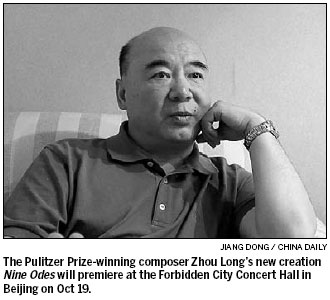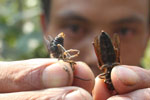Epic for the ears
Updated: 2013-10-18 08:09
By Chen Jie (China Daily)
|
||||||||
After his acclaimed success with composer Zhou Long wraps his arms around another classic, the ancient Chinese poem Chen Jie reports.
The Pulitzer Prize-winning composer Zhou Long first saw Yu Long conduct in Guangzhou in 2009. The Guangzhou Symphony Orchestra had commissioned Zhou and his composer wife Chen Yi to create an orchestral work Humen 1839, and its music director Yu took the baton to premiere it.
"I was impressed by Yu's sense of music," Zhou says.
"My wife was born in Guangzhou so she applies many Cantonese folk music elements in the score, but at first the orchestra did not bring them out. Yu worked on every detail of the score during the rehearsal and said, 'Come on, as the orchestra of the city, can you give me some local flavor?'"
The composer and conductor arranged a breakfast together.
Zhou asked Yu, "Why haven't you ever conducted my work before?". Yu answered, "I did conduct a few of your pieces before, but let's explore new projects. What are you writing now?".
Zhou told Yu that Boston Opera had commissioned him to write the opera Madame White Snake. Yu then decided to co-commission the opera, which ultimately won the Pulitzer Prize for Music in 2011. In October 2010, Yu also brought it to the Beijing Music Festival, where he served as the artistic director.
It was also at that breakfast that Yu initiated plans to create a work based on the ancient Chinese poem Nine Odes (also known as Nine Songs).
Written by Qu Yuan (340 BC-278 BC), Nine Odes is his signature work and an important chapter of Chuci, also known as the Songs of Chu or the Songs of the South. Despite the "nine" in the title, it consists of 11 songs to describe and celebrate the religion, ritual and local culture of the region south of the Yangtze River.
"When Yu initiated Nine Odes, I really loved this idea. Homer is voluminous and tragic but Nine Odes has its brilliant rhyme and supernatural romantic imagination. Eleven songs would be 11 movements that will definitely be a whole evening. It's an ambitious project," says Zhou.
Zhou loves Chinese poetry and has created works based on other classics including Shi Jing (Book of Songs) and Qu Yuan's Li Sao (The Lament).
He first read Nine Odes in 1974 when he came back to Beijing from the countryside of Hebei and Heilongjiang, where he spent five years during the "cultural revolution" (1966-76). His soprano mother asked him to learn the piano and ancient poetry.
"I could not understand the poems and had no idea they were actually folk songs from ancient times. But anyway, I learned Nine Odes, Shi Jing and Li Sao and wrote music for some poems after learning composing," says Zhou.
Beijing Music Festival commissioned Nine Odes to premiere in 2013 to celebrate Zhou's 60th birthday.
"Of course, after Madame White Snake I could not compose anything for a year, because the opera exhausted me. I had to restart with a chamber work and then a 40-minute symphonic suite called Beijing Rhyme for the Beijing Symphony Orchestra. I finally started Nine Odes last fall," says Zhou. After winning the Pulitzer award, he received lots of invitations for lectures, concerts and guest professor lecturing, he says, but he usually refused politely because he wanted to concentrate on composing.
It has been a challenge. Nine Odes has inspired other artists to do dance, orchestral work and even a sculpture based on one figure - the mountain ghost - of the poem. But nobody has set the full original text.
"The language, the text (in ancient Chinese) is difficult. Everybody might have heard of Nine Odes, but I believe very few remember the lines, let alone understand it. Even if you can read the lyrics, you could hardly understand the implication. I'm not sure I myself get the meaning," Zhou says and admits sometimes he reads English translations and then goes back to the Chinese so he can understand better the ancient meaning. "Throughout the creative process, I realized that it is not just ritual, religious celebration, gods. I was deeply affected by its romantic rhyme. Qu Yuan is great. Ancient Chinese poets loved nature so much and enjoyed singing for nature, but Qu Yuan worships nature. He uses the wonderful imagination of the gods to express his deepest thoughts and love for his country and people."
Zhou uses a soprano (Huang Ying), a mezzo-soprano (Liang Ning), a tenor (Warren Mok) and a baritone (Yuan Chenye) to sing with the orchestra (Guangzhou Symphony Orchestra) to form the entire 70-minute symphonic epic interpretation of Nine Odes. It includes a variety of combinations of solos, duets and quartets with the large orchestra to create numerous, vivid roles and musical characters.
Nine Odes will premiere at the Forbidden City Concert Hall under the baton of Lin Daye on Oct 19.
Contact the writer at chenjie@chinadaily.com.cn.

(China Daily 10/18/2013 page20)

 Victoria Beckham S/S 2014 presented during NYFW
Victoria Beckham S/S 2014 presented during NYFW
 'Despicable' minions upset Depp's 'Lone Ranger' at box office
'Despicable' minions upset Depp's 'Lone Ranger' at box office
 'Taken 2' grabs movie box office crown
'Taken 2' grabs movie box office crown
 Rihanna's 'Diamonds' tops UK pop chart
Rihanna's 'Diamonds' tops UK pop chart
 Fans get look at vintage Rolling Stones
Fans get look at vintage Rolling Stones
 Celebrities attend Power of Women event
Celebrities attend Power of Women event
 Ang Lee breaks 'every rule' to make unlikely new Life of Pi film
Ang Lee breaks 'every rule' to make unlikely new Life of Pi film
 Rihanna almost thrown out of nightclub
Rihanna almost thrown out of nightclub
Most Viewed
Editor's Picks

|

|

|

|

|

|
Today's Top News
US not budging on its arms restrictions on China
China's GDP rises 7.8% in Q3
China warns of emerging markets' slowing demand
Roche boosted by strong drug sales in US, China
IBM's China-driven slump sparks executive shakeup
Can cranberries catch on in China?
Asia-Pacific pays executives world's highest salaries
Trending news across China
US Weekly

|

|







